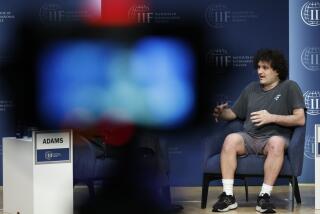Cranston Steadfastly Denies Guilt : Senator: Embattled lawmaker is still trying to defuse furor over his role in Lincoln S&L; fiasco. He rejects charge that he was one of the two ‘most culpable’ senators.
- Share via
SANTA ANA — Sen. Alan Cranston, continuing his counterattack Friday on the adverse publicity linking him to the Lincoln Savings & Loan scandal, rejected a charge that he was one of two senators “more culpable” than others for their roles in the collapse of the Irvine thrift.
The California Democrat said he found nothing wrong in seeking $850,000 from Lincoln’s parent company, American Continental Corp., despite knowing in April, 1987, that regulators were asking federal authorities to investigate possible criminal wrongdoing by the company’s chairman, Charles H. Keating Jr. and others.
In retrospect, Cranston said, he should have taken more seriously the intent of federal regulators to pursue a criminal investigation of Lincoln’s operators.
The senator also said he was advocating at the time that regulators come to a decision and end their long audit of Lincoln by taking action against the S&L; or leaving it alone. Such a call for action, he said, should put to rest continued claims by others that his intervention delayed the eventual government takeover of Lincoln for two years, thereby doubling the eventual cost to repair the thrift.
Regulators eventually seized Lincoln on April 14, a day after Phoenix-based American Continental filed for bankruptcy protection. The S&L; may become the biggest thrift bailout, costing taxpayers up to $2 billion.
That bill doesn’t include the massive losses of American Continental bondholders, which include about 22,000 people who bought nearly $200 million in debt securities at Lincoln’s 29 Southern California branches. About two-thirds of those bondholders are over 65 years old and many mistakenly thought that what they were buying was federally insured.
Cranston, in a press briefing before he spoke in Santa Ana on women’s rights, defended his actions since April, 1987, when he and four other senators met with regulators twice over an unusually long financial audit of Lincoln.
On Friday, apparently for the first time, he responded to a recent claim by Edwin J. Gray, who until June 30, 1987, was chairman of the Federal Home Loan Bank Board, which regulated thrifts. Gray had singled out Cranston and Dennis DeConcini (D-Ariz.) for heavier blame in the Lincoln fiasco.
Cranston and three senators met with Gray on April 2, 1987, to find out why the examination of Lincoln had lasted more than a year. At Gray’s suggestion, the senators, along with Donald W. Riegle Jr. (D-Mich.), met a week later with regulatory executives.
Gray has claimed that in the first meeting with him, the senators tried to make a deal for Keating, a charge all four vehemently deny. The second meeting ended abruptly when regulators said they would ask the Justice Department to investigate criminal charges against Lincoln’s operators.
Asked three weeks ago who was “more culpable than others” in the meetings, Gray quickly identified Cranston and DeConcini. Gray singled out the Arizona senator for allegedly pursuing the deal and continuing to deny it.
“And Senator Cranston,” Gray said, “who after those meetings, went back to Phoenix and he got $850,000 for some phony voter registration groups to help him with his election. . . .” Gray claimed that Cranston should have steered clear of Keating once he learned that criminal charges were being sought by regulators.
But, Cranston said, that fact “made it seem more urgent” for regulators to take action on their audit. He pointed out that even Gray has said that Cranston’s only statement in the first meeting related to efforts to get the regulators to decide on Lincoln.
Cranston said that federal agencies frequently ask the Justice Department to look into possible criminal conduct and that many times the charges are unfounded.
“I did not take it that seriously,” he said about the regulators’ intent to pursue a criminal probe of Keating and others. “Perhaps, in retrospect, I should have. Given the developments that have occurred, he may well have been violating laws and, if so, they should throw the book at him.”
Cranston said he knew nothing about the bond sales at Lincoln branches, and he termed the losses of bondholders “tragic.”
WARM OFFER--Lincoln Savings ad invites public for cider and cookies. D1
More to Read
Get the L.A. Times Politics newsletter
Deeply reported insights into legislation, politics and policy from Sacramento, Washington and beyond. In your inbox twice per week.
You may occasionally receive promotional content from the Los Angeles Times.







